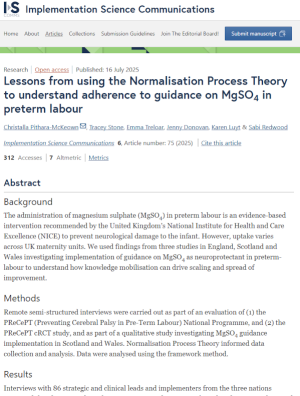Research reveals strategies to scale quality improvement and evidence-based practice
29 July 2025
Researchers have studied how knowledge mobilisation affected whether maternity units follow NICE guidelines on administering magnesium sulfate to mothers in pre-term labour. Their findings, which could apply to the spread of other evidence-based practices in clinical care, are published in Implementation Science Communications.
This work used PReCePT (Prevention of cerebral palsy in pre-term labour) as a case study. Evidence shows that babies can be protected from brain injury by giving magnesium sulfate to women who are at risk of premature birth. This medicine, costing around £5 per dose, reduces the risk of cerebral palsy by a third.
The use of magnesium sulfate to prevent cerebral palsy has been recommended by NICE since 2015. Although maternity units were giving magnesium sulfate to some mothers in premature labour, many were not being given this important treatment.
PReCePT was developed to address this issue. It provided practical tools, guidelines, and training to support hospital staff to give magnesium sulfate to eligible mothers.
This new paper builds on previous research which highlighted the essential ingredients to overcoming some of the challenges to administering evidence-based clinical interventions, including knowledge mobilisation. This latest research establishes some general principles about how knowledge mobilisation activities can help spread evidence-based practice across teams and settings.
The researchers identified strategies to scale improvement and embed evidence-based practice, including:
- Identifying and addressing the needs of local teams for implementation and improvement support
- Promoting equity in implementation through addressing issues of power, agency, participation and staff access to needed resources
- Networks and communities of staff covering all levels and roles involved in perinatal care, to share and spread knowledge
- Staff with time and funding allocated to them specifically to champion the guidance and participate in communities of practice
- Strong leadership to ensure staff at all levels and in all roles are involved and feel motivated
Implementing these findings can help ensure patients across the UK have access to high-quality care, based on the latest guidelines.
A neonatologist interviewed as part of the study, said:
“A lot of it was understanding the why we want you to change your behaviours, and if you don’t know the evidence why would you change your behaviour?
“So, I think it’s having those shared common goals across all of our specialties, and building the team from that joined-up approach from the start, and not just working in a silo.”
Dr Christalla Pithara-McKeown, Senior Research Associate at the University of Bristol and lead author, said:
“Our findings show how clinical guidelines are not enough for ensuring patients receive evidence-based care no matter where they are. Teams and individual clinicians always try to do their best but there is variation in capacity, capabilities, and organisational resources available to clinicians and these result in care inequities.
“We show how quality improvement interventions which use knowledge mobilisation approaches can drive scaling and spreading of improvement. This requires capacity within the system to enable knowledge sharing and co-creation between groups involved in healthcare, including clinicians, patients, clinical leaders and managers.
“It also requires strong leadership, protected time and funding for local champions, and addressing power imbalances between all those involved.”
Paper
